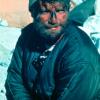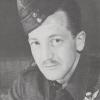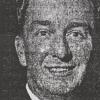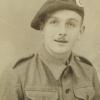Originally published in Cheshire Regiment Association Newsletter, September 2002. More on the 22nd Cheshire Regiment can be found here.
Brigadier M D K Dauncey DSO DL succeeded Major General P L de C Martin CBE as Colonel of the Regiment in 1978. He relinquished the appointment in 1985, when Brigdier W K L Prosser CBE MC, succeeded him. Brigadier Mike joined the 22nd in 1941 from 170(MG) OCTU at Droitwich. While there, he met the legendary Colonel Arthur Crookenden CBE DSO, who was Colonel of the Regiment from 1930-1947. After this meeting, there was never any doubt in Brigadier Mike’s mind, about which Regiment he hoped to join.
He was posted to the 5th (Earl of Chester’s) Bn at Warrenpoint. The Battalion had been raised by Lt Colonel (later Sir Walter) Bromley-Davenport, the father of the Regiment’s Honorary Colonel. Young Mike’s first Company Commander was Major (later Lt General Sir Napier) Crookenden.
In 1943, after a number of months in Southern England, 5 CHESHIRE became a Training Bn in Anglesey, North Wales, responsible for training officers and soldiers for overseas. Following General Sir Napier’s lead, Brigadier Mike also volunteered for Airborne Forces and was seconded to The Glider Pilot Regiment with which Regiment a fellow 22nd officer — Major A J Cooper AFC, had been killed in action in the Airborne landings in Sicily, earlier that year. Brigadier Mike’s Squadron supported the three Airborne Operations in North West Europe in 1944/45, but he only took part in one of them, Operation 'Market Garden', at Arnhem, Holland.
After the end of World War II, he was married. His next appointment was to Athens, as Military Assistant to the C-in-C Land Forces, Greece. He then joined a PARA Bn in BAOR, Commanded by Lt Colonel (later Maj General) John Cubbon, who had given it a definite 22nd flavour. In many ways, it was similar to 1 CHESHIRE’S tour in Suez, in the 1950s.
After 1957, Brigadier Mike followed in General Peter Martin’s footsteps, with appointments as an Instructor at Sandhurst, as well as Brigade Major, 126 Infantry Brigade. He then succeeded General Peter as CO 1 CHESHIRE, in BAOR, from 1963-66. In the middle of the tour, the Battalion was posted to Cyprus for 6 months on a United Nations Tour, when the 1st Battalion soldiers excelled in keeping the peace between the Greeks and the Turks — friendly but firm. It was shortly before going to Cyprus, that the 1st Battalion Officers and Warrant Officers started to wear the now well-known Regimental pullover.
Then followed a number of appointments which would, Brigadier Mike was told, 'broaden his outlook'. They were: 1966-68 DS Plans, Joint Services Staff College 1968-69 Commandant, Jungle Warfare School 1969-72 Commandant, Support Weapons Wing, School of Infantry 1973-75 Defence & Military Attaché, British Embassy Madrid. During these years, the most difficult problem was to learn Spanish, when aged 52.
After retirement, he decided that he would like to work locally. Inevitably, this limited his choice of appointment. He spent six months with a Housing Association, before it was taken over. Then followed a year with Hambro Life Assurance, which was good experience for dealing with civilian life!
However, in 1978, to his delight, he followed General Peter Martin yet again, to become Colonel of The Regiment. It was an extremely happy time for him due to all the support, advice and many kindnesses, which he received throughout his tour. There were occasions, when this support and advice had a crucial result for the 22nd. Firstly, when the late Lord Leverhulme with the support of The Director of Infantry, succeeded in gaining the approval of the Army Board for the formation of 3 CHESHIRE. Secondly, when, due to General Sir Charles Harrington’s advice, together with the help of the judiciary, a plan by the MOD to remove The 22nd from The Castle, Chester, was averted. Finally, The Regiment also owes the running of “The Cheshire Regiment Handicap Stakes”, in Chester Races, to the generosity and thoughtfulness of the late Lord Leverhulme.
Since then Brigadier Mike has settled down happily in Gloucestershire, where his grandfather was born. He was appointed Deputy Lieutenant in 1983, when one of his early tasks was to raise the funds for Prince Philip’s Appeal for Commonwealth Veterans.
He also kept some links with the Army, as follows: 1980-82 Chairman, Glos Joint Services Cadet Committee 1981-90 Hon Colonel, 1st Cadet Bn Glos Regiment (ACF) 1994-98 President, The Glider Pilot Regiment Association 2000 & 2008 Leader The Airborne Pilgrimage to Arnhem
Editorial Footnote: It is mentioned above that Brigadier Dauncey took part in the battle of Arnhem where he won his DSO. It is 58 years ago this month that Operation Market Garden took place and as a Lieutenant in the Glider Pilot Regiment he landed on the first lift on the 17th September 1944. A week later on the 24th September he received a severe wound to his left eye and the following day was wounded twice more. He was taken prisoner.
He and others who had eye wounds received marvelous treatment at the famous eye hospital at Utrecht. As the hospital was run by Dutch doctors and nurses they were put on parole. The time came for him to go to the St. Antonious German Prison Hospital, which was also in Utrecht prior to being sent to Germany. Here he met Major Gordon Cuningham from 5 Black Watch who had been shot through both legs and taken prisoner whilst on a recce. They decided that the best plan would be to escape from St. Antonious Hospital. Accordingly fitting in with the movement of the guards they lowered themselves to the ground from the first floor on knotted sheets. They then managed to get over the barbed wire perimeter fence and, with the help of some very brave Dutch people, they stayed at the English Parsonage until the 4th February 1945, a period of over four months while the town was still under German occupation.
During this time Gordon Cuningham’s legs were treated by a Dutch doctor and plans were made with the local underground for them to cross back to the Allied lines. They left Utrecht on bicycles disguised as doctors. Their route was Culemborg - Buren to the River Waal which they crossed. When it was light they went forward to the Allied lines with hands up. It was a strange feeling as they were so near, yet things could still go wrong. Belgian soldiers were holding that part of the line. After debriefing and a meal with unbelievable white bread they were flown back to England. Brigadier Dauncey’s Arnhem experience lasted nearly 5 months, a quite remarkable achievement.
Brigadier Dauncey was commissioned into the Cheshire Regiment 61 years ago and it has been a pleasure to recall his achievements and support for the Regiment and the CRA over these past six decades.
Courtesy of Cheshire Regiment Association Newsletter, September 2002. Supplied to ParaData by Phil Jennett.
Source: Courtesy of Cheshire Regiment Association Newsletter, September 2002. Supplied to ParaData by Phil Jennett.
Read More




Latest Comments
There are currently no comments for this content.
Add Comment
In order to add comments you must be registered with ParaData.
If you are currently a ParaData member please login.
If you are not currently a ParaData member but wish to get involved please register.